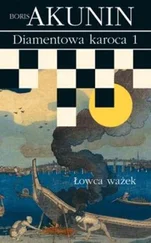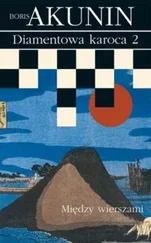At the corner of Krivokolenny Street, at a poorly lit and deserted spot, Rybnikov put a rouble note on the seat, jumped down on to the road – gently, without even making the carriage sway – and ducked into a gateway.
As they say, God takes care of those who take care of themselves.
The sixth syllable, in which a tail and ears play an important part
Special No. 369-B was expected at precisely midnight, and there was no reason to doubt that the train would arrive on the dot – Fandorin was being kept informed of its progress by telegraph from every station. The train was travelling ‘on a green light’, with priority over all others. Freight trains, passenger trains and even expresses had to give way to it. When the locomotive with only a single compartment carriage went hurtling past an ordinary train that had inexplicably come to a halt at the station in Bologoe or Tver, the worldly-wise passengers said to each other: ‘Higher-ups in a hurry. Must be some kind of hitch in Moscow’.
The windows of the mysterious train were not only closed, but completely curtained over. During the entire journey from the present capital to the old one, 369-B stopped only once, to take on coal, and then for no more than fifteen minutes.
They were waiting to meet the mysterious train outside Moscow, at a small way station surrounded by a double cordon of railway gendarmes. A fine, repulsive drizzle was falling, and the lamps were swaying in a gusting wind, sending sinister shadows scuttling furtively across the platform.
Erast Petrovich arrived ten minutes before the appointed time, listened to Lieutenant Colonel Danilov’s report on the precautions that had been taken and nodded.
Court Counsellor Mylnikov, who had been informed of the imminent event only an hour earlier (the engineer had called for him without any forewarning), couldn’t keep still: he ran round the platform several times, always coming back to Fandorin and asking: ‘Who is it we’re waiting for?’
‘You’ll see,’ Fandorin replied briefly, glancing every now and then at his gold Breguet.
At one minute to twelve they heard a long hoot, then the bright lights of the locomotive emerged from the darkness.
The rain started coming down harder, and the valet opened an umbrella over the engineer’s head, deliberately standing so that the drops ran off on to Mylnikov’s hat. However, Mylnikov was so worked up that he didn’t notice – he merely shuddered when a cold rivulet ran in under his collar.
‘The head of your division, is it?’ he asked when he made out the compartment carriage. ‘The chief of the Corps?’ And finally, lowering his voice to a whisper: ‘Not the minister himself, surely?’
‘Exclude all unauthorised individuals!’ Fandorin shouted when he spotted a linesman at the end of the platform.
Gendarmes went dashing off with a loud tramping of boots, to carry out the order.
The 369-B came to a halt. Evstratii Pavlovich Mylnikov thrust out his chest and whipped off his bowler, but when the clanging of iron and screeching of brakes stopped, his ears were assaulted by a strange sound very similar to the diabolical ululations that tormented his ailing nerves at night. Mylnikov gave his head a shake to drive away the dark spell, but the howling only grew louder, and then he quite clearly heard barking.
An officer in a leather pea jacket skipped smartly down the steps, saluted Fandorin and handed him a package bearing a mysterious inscription in black: RSEUDPWUHPHHDAPO.
‘What’s that?’ Mylnikov asked in a faltering voice, suspecting that he was dreaming all this – the engineer’s appearance in the middle of the night, the drive through the rain, the dogs’ barking and the unpronounceable word on the envelope,
Fandorin decoded the abbreviation:
‘The Russian Society for the Encouragement of the Use of Dogs in Police Work under the Honorary Presidency of His Highness Duke Alexander Petrovich of Oldenburg. Very well, L-Lieutenant, you can bring them out. The horseboxes are waiting.’
Police officers started emerging from the carriage one after another, each leading a dog on a leash. There were German shepherds and giant schnauzers and spaniels, and even mongrels.
‘What is all this?’ Mylnikov repeated perplexedly. ‘What’s it for?’
‘This is Operation Fifth Sense.’
‘Fifth? Which one’s the fifth?’
‘Smell.’
Operation Fifth Sense had been planned and prepared with the utmost dispatch in a little over two days.
In the urgent telegram of 18 May that had so greatly astonished the experienced police telegraph clerk, Fandorin had written to his chief: ‘REQUEST URGENTLY GATHER DUKE’S DOGS DETAILS FOLLOW’.
Erast Petrovich was an enthusiastic supporter and even, to some extent, inspirer of the initiative undertaken by the Duke of Oldenburg, whose idea was to establish in Russia a genuine, scientifically organised police dog service on the European model. This was a new area, little studied as yet, but it had immediately been given massive backing.
Coaching a good dog to track down a specific smell required only a few hours. The amount of simose needed was allocated from the Artillery Department and work began: fifty-four police instructors thrust the noses of their shaggy helpers into the yellow powder, the air was filled with reproachful and approving exclamations, peals of barking and the cheerful sound of sugar crunching between dog’s teeth.
Melinite had an acrid smell and the tracker dogs recognised it easily, even among sacks of common chemical products. Following a brief training course, His Highness’s protégés set off on their work assignments: twenty-eight dogs went to the western border – two to each of the fourteen crossing points – and the rest went on the special train to Moscow, to receive further instructions from the engineer Fandorin.
Working by day and night in two shifts, the handlers led the dogs through the carriages and depots of all the railway lines of the old capital. Mylnikov did not believe in Fandorin’s plan, but he didn’t try to interfere, just looked on. In any case, the court counsellor had no ideas of his own on how to catch the Japanese agents.
On the fifth day, Erast Petrovich finally received the long-awaited telephone call in the office where he was studying the most vulnerable points of the Trans-Siberian Railway, all marked on a map with little red flags.
‘We’ve got it!’ an excited voice shouted into the receiver over the sound of deafening barking. ‘Mr Engineer, I think we’ve got it! This is trainer Churikov calling from the Moscow Freight Station on the Brest line! We haven’t touched a thing, just as you ordered!’
Erast Petrovich telephoned Mylnikov immediately.
They dashed to the station from different directions, arriving almost simultaneously.
Trainer Churikov introduced his bosses to the heroine of the hour, a Belgian sheepdog of the Grunendal breed:
‘Mignonette.’
Mignonette sniffed at Fandorin’s shoes and wagged her tail. She bared her fangs at Mylnikov.
‘Don’t take offence, she’s in pup,’ the handler said hastily. ‘But it makes the nose keener.’
‘Well, what is it you’ve found?’ the court counsellor demanded impatiently.
Churikov tugged on the dog’s lead and she plodded reluctantly towards the depot, glancing back at the engineer. At the entrance she braced her paws against the ground and even lay down, making it very clear that she was in no hurry to go anywhere. She squinted up at the men to see whether they would scold her.
‘She’s acting up,’ the trainer said, sighing. He squatted down, scratched the bitch’s belly and whispered something in her ear.
Mignonette graciously got up and set off towards the stacks of crates and sacks.
Читать дальше









